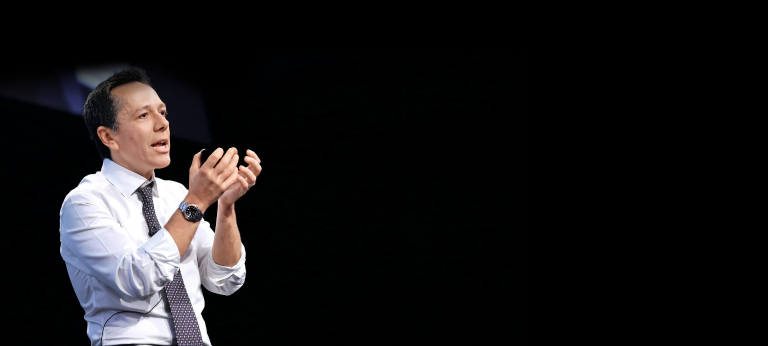How robust is your company?
![{[downloads[language].preview]}](https://www.rolandberger.com/publications/publication_image/TA31_Cover_EN_download_preview.jpg)
Think:Act Magazine explores how today’s companies can become robust and survive the coming decade through lessons in innovation, purpose and adaptation.


The call for lifelong learning is becoming more urgent as businesses and employees try to keep up with fast-paced change. Millions are flowing into training programs, but how do we define successful learning outcomes?
94% is the percentage of respondents to a 2019 LinkedIn Learning survey who reported they would stay longer at a company if it invested in helping them learn.
These are unpredictable times and it's no longer just businesses that find themselves facing an ongoing struggle to remain relevant in the marketplace – but employees, as well. As industries are upturned by technological change, people find that the skills that once served them well are no longer the right ones.
The need to address this is urgent on all sides. And yet the model of corporate learning that has served businesses for generations is itself in turmoil. In the past, employees could expect their loyalty to be rewarded with a linear career progression within a top-down learning model in which junior staff were mentored by senior staff. Today, that rarely happens. The world of work has become altogether more fluid and mobile, with people moving not just between companies, but also across industries several times in the course of a lifetime's career.
Learning and training are therefore taking a more significant and markedly different role both for employers and employees today. The value of learning is rising and becoming more strategic. Businesses need to ensure that their staff have the skills they need right now. Employees want to ensure they are equipped for future moves. Companies that can credibly promise relevant learning opportunities are more attractive than their competitors.
From senior executives to young professionals, learning at every level has to be planned. It is a prerequisite for survival in turbulent times. How do businesses deliver on this promise? Gianpiero Petriglieri , associate professor of organizational behavior at INSEAD, says that most organizations focus only on what he calls incremental learning – learning that aims to improve and practice clearly defined tasks. It tends to take place in something akin to a boot camp that replicates the working environment in a safe mode, where people can practice skills, get feedback and improve.
"There’s a place for that kind of approach, but when the future is unclear, and the past is a hindrance to moving on, learning from traditional models will not deliver the results required to succeed," says Petriglieri. "Incremental learning enforces established norms and power structures." What companies should be doing instead is creating the culture and space needed to foster transformative learning. "Transformative learning takes people on a very different journey. One that often begins with unlearning what you know," he says. It is about asking the difficult questions; to do it requires slowing down, paying attention to what you are doing now, observing, reflecting and recognizing the part you play, then experimenting with alternatives to reach a better outcome.
"All the great movements of change start with someone saying, 'Pay attention, don't take the status quo for granted, ask questions and talk about it!'" says Petriglieri. "Any dictatorship tells us the opposite: 'Don't pay attention and don't talk about it!' The reason why we may find transformative learning difficult is simply because we have an inner dictator who tells us if we get it wrong, we are at risk."
That people self-censor is understandable. Successful senior executives often receive mixed messages. They are told to be disruptive but at the same time not to rock the boat. "In business we usually worship two gods: efficiency and alignment. These are the prerequisites for scaling, generating less cost and avoiding errors. But they hinder transformative learning, which is inefficient and misaligned by nature," says Petriglieri. "The more people around you depend on your work, the more hesitant you become to try something new."
"As businesses, we need to empower people by enabling them to find out what their purpose is."
It is also hard for a person to question the system they have benefited from. However, you can't achieve transformative learning without the willingness to challenge the status quo. "There are two emotional enemies of learning: anxiety and pride. The worst case is a cocktail of both," says Petriglieri. The combination makes it impossible for the human brain to take a sober look at risks and prevents any recognition of opportunity.
Yet in today's fast-paced world openness and curiosity are exactly what is needed. "To survive in business, you need to be resilient. In the 20th century, that meant being tough and building companies like fortresses. Today, it means being able to adapt and change to new situations and to collaborate in fluent networks rather than standing firm in cemented hierarchies and rigid structures," says Tim Munden, chief learning officer at Unilever.
It's telling that a company almost a century old is putting an emphasis on learning, which almost underlines how an openness to new ideas can help big and established corporations stay relevant and successful. What, then, is the underlying driver that enables people and organizations to foster the right attitude and embrace change in a learning context? "Both individuals and organizations need to discover and clearly articulate their purpose. Once we have found what fulfills us, we can assess what skills we need to do that," says Munden. "As businesses we need to empower people by enabling them to find out what their purpose is in life. The heart of our learning culture is making it possible to think about this."
83% is the percentage of learning and development (L&D) professionals in a 2020 LinkedIn Learning survey who said their executives support employee learning.
The number of Unilever employees that have embarked on such a journey has already reached 51,000. The company runs workshops in which small groups share their stories. They talk about experiences in their working lives – and even back to childhood – in order to understand what their own sense of purpose is. To scale this approach, Unilever trained their own people to conduct the workshops, empowering employees to learn from each other in a safe, supporting environment.
"This is the foundation that helps everyone to work out what they need. Once this is established, we can provide the tailored learning needed to achieve the required skills," says Munden. An online platform feeds the hunger for knowledge. Here people can define what they need, then learn and test their new skills, follow others and share content. It helps create groups, build communities and make clear what the company's priorities are so that personal and company purpose converge. By the end of 2019, some 26,000 of its employees were using the platform each month. To make such a system work for a large number of people, clever algorithms are deployed to identify needs, create and curate the right content and measure skills development. Munden points out that this is a never-ending task. "Curiosity is essential and needs to be nurtured. We have to make learning an everyday thing," he adds.
When it comes to leadership development, Unilever's approach isn't just about teaching new skills but also offering space for people to develop their inner game. "This is how we describe the purposeful, emotional and psychological core of leadership, such as personal mastery. It is particularly vital now," says Munden. In one three-day-long experiential workshop, senior leaders reflect on their purpose, how they bring their best self and on feedback that they are struggling with to look at what's getting in the way. There isn't a single distracting PowerPoint slide.
27% is the percentage of L&D professionals in the same survey who said that their CEOs are active champions of learning.
In this sense, corporate learning is both personal and transformative. It is a long way from the old model of classroom exercises. For Petriglieri, most corporate learning still fails to meet these new demands and is therefore little more than a protection racket. "People and businesses are told they are threatened by a critical situation and then told what to do to avert it. But in most cases, this merely postpones the actual threat," he says.
Transformative learning, in contrast, is less about threats than about imagination. "A good mentor is someone who helps us to imagine ourselves in ways we find hard to envisage because of the constraints posed by internal or external circumstances," he says. "A leader with the right understanding acknowledges the difficulty and the challenges involved in change, but also links it to hope. Learning is leadership because they both rest on the same fundament: the cultivation of hope." When learning involves such profound changes, is it possible to measure its success? Laszlo Bock, CEO of Humu, former senior vice president of people operations at Google and the author of Work Rules – Insights from Inside Google, believes it is possible.
Like Petriglieri, he thinks that much of what passes for corporate learning today fails to deliver on its investment. "Although $371 billion is spent a year on training by larger companies globally, in most cases there are no evaluation metrics in place to measure behavioral change or impact on business performance," he says. "Most companies could shut down 80% of their training and yet feel zero effect."
"It is about delivering the right content to the right people in the right context."
Businesses need to change their expectations and approach, believes Bock – they need to understand that learning at work is not about the number of hours put in, but about gently directing people in a way so that they feel more tolerant to change and less forced. In order to achieve this, companies need to know more not just about the efficacy of learning programs but about people analytics and computer science. "It is all about delivering the right content to the right people in the right context," he says.
Bock's company Humu nudges people towards better work habits, unlocking the potential of individuals, teams and organizations. Based on a machine learning system, its Nudge Engine helps employees develop more productive behaviors by sending small, unintrusive, research-backed suggestions and reminders through email or other messaging platforms. The programs are customized to correspond to an individual’s role and behavior. "Typically, we register an 8-12% productivity lift in the companies using our nudges," says Bock.
Where will corporate learning be five years from now? Munden believes digital technology will accelerate the need for change while providing the means for deeply personalized lifelong learning. The trend of giving people access to tailor-made learning – feeding the right content to the right people at the right time – will continue and will become increasingly and ever more deeply automated. But it will also be deeply human, he believes, because the more digital disruption shapes our working and social lives, the more human skills will matter. "In the future, those who bring a blend of technical and human skills will be most successful," he says. "As the world evolves, the deeply human capabilities of providing purpose, working collaboratively and acting with agility are more important than ever."
Tomorrow's world will require skill sets that are very different to those needed today. No CEO or employee can afford to ignore the impact of big data, machine learning and AI. At the same time, the technology driving these changes also offers new ways of learning, enabling us to keep pace. Das Narayandas, Edsel Bryant Ford professor of business administration and senior associate dean for Harvard Business School Publishing and External Relations, calls it the Personal Learning Cloud. The term refers to the growing number of social and interactive platforms, online courses and learning tools with features that fill several key gaps in the traditional corporate education market. They provide personalized learning that adapts to individuals' learning style and work environment. Organizations can track progress and deploy modules to meet the evolving needs of employees.
Crucially, these services also provide contextualized learning, enabling engagement in the mode that is relevant to an individual's work environment, bridging the skills transfer gap and ensuring that what is learned is also applied. Several elements of the Personal Learning Cloud already exist. MOOCs (massive open online courses) and platforms such as Coursera, edX and 2U deliver interactive online content. Easily accessible training and development ecosystems are provided by Harvard Business Publishing, LinkedIn Learning, Harvard Business School Online, Skillsoft, Degreed and Salesforce Trailhead. Talent management platforms like SmashFly, Yello and Phenom People connect learning needs and learning outcomes to recruitment retention and decisions concerning promotion within organizations.
The next stage of development, as Narayandas sees it, will be powered by blockchain technology, which will allow individuals and businesses to track learning outcomes and authenticate acquired skills, potentially disrupting traditional professional degrees, replacing them with a system of microcertifications.
Will these new forms of learning render traditional learning models obsolete? Not according to Narayandas. "Despite its disruptive qualities, the personal learning cloud is an augmenting solution," he says. "What we will have in future is a blend of different learning practices. With traditional players rapidly adapting to the new challenges and opportunities, and startups entering this space with new ideas, innovative forms of learning are developing rapidly. What we see today are merely the ripples of a tectonic shift yet to come."
![{[downloads[language].preview]}](https://www.rolandberger.com/publications/publication_image/TA31_Cover_EN_download_preview.jpg)
Think:Act Magazine explores how today’s companies can become robust and survive the coming decade through lessons in innovation, purpose and adaptation.
Stay up to date on the latest global trends and developments in the business world. Subscribe to Roland Berger's Think:Act Magazine now and get access to this and upcoming editions as PDF, including articles by renowned authors and exclusive interviews with thought leaders.

